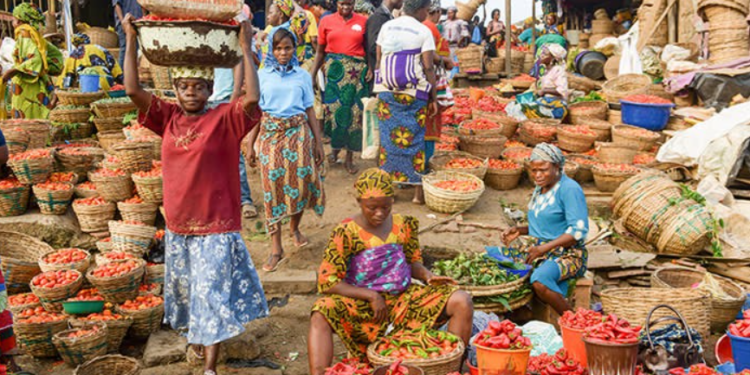
The cost of living continues to escalate for rural Nigerians as the latest data from the National Bureau of Statistics (NBS) shows that the Rural Consumer Price Index (CPI) for food has nearly doubled over the past three years.
The index, which uses November 2009 as its base year (100), highlights a sharp upward trajectory in average food prices, underscoring the significant inflationary pressures faced by rural communities.
From April 2021 to April 2024, the overall increase in the average food prices for rural Nigerians was a striking 99.22%.
This near-doubled food prices over three years highlights the acute inflationary pressures affecting rural Nigerians.
Such a rise in the cost of food underscores the severe economic challenges faced by rural households, where food expenditure constitutes a significant portion of total household spending.
From March 2021 to April 2024, the Rural CPI for food showed a persistent upward trend. In March 2021, the food CPI stood at 419.7, increasing marginally to 423.7 in April 2021.
By March 2022, there was a notable rise to 488.4, and the index climbed further to 497.9 in April 2022. This marked a year-on-year (Y-O-Y) increase of 17.50% and a month-on-month (M-O-M) rise of 1.94%.
The inflationary pressure continued as the rural food CPI escalated to 601.4 in March 2023 and reached 613.2 in April 2023, with Y-O-Y inflation at 23.17% and M-O-M inflation at 1.97%.
The trend intensified in 2024, with the rural food CPI surging to 827.4 in March and peaking at 844.2 in April. This indicated a substantial Y-O-Y increase of 37.66% and an M-O-M increase of 2.02%.
Earlier reported that the third quarter of 2023 saw the rural unemployment rate climb to 4.0%, a substantial rise from the 2.5% recorded in the previous quarter. This 60% increase in just three months highlights a growing crisis, with insecurity in farming regions significantly contributing to the uptick in joblessness.
Aside from adding to unemployment, the persistently precarious security situation in Nigeria’s northern states has severely hampered food production, leading to an alarming rise in hunger and worsening food inflation.
The Lagos Commodities and Futures Exchange (LCFE) recently noted that the Nigerian economy is experiencing a food crisis with fast-rising food costs, cost of transportation, insecurity, poor infrastructure, and foreign exchange instability.
A recent analysis by SBM Intelligence reported that farmers across the country paid on average up to N100,000 to bandits for permission to farm mostly in the northern parts of the country.
A report by Save the Children projected that one in every six children, which is 15 million in Nigeria, will go hungry during the period starting from June 2024 as high food inflation persists. The report noted that the number of children projected to be hungry from June this year is 25% higher than 2023 mainly caused by conflicts, banditry and elevated levels of food inflation. This represents an additional 3.5 million children to the figure for last year.
In a recent survey by across the local food markets in Lagos, there is a noticeable fall in the prices of foreign-produced foods or foods with foreign raw materials, while the prices of locally produced foods continue to rise.
The relentless rise in food prices necessitates urgent policy interventions to alleviate the burden on rural communities. Strategies to enhance food production, stabilize supply chains, and control inflation are critical.






